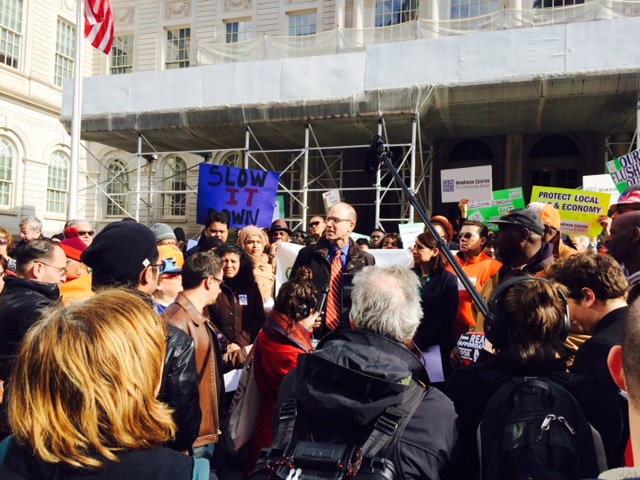At a City Council hearing last week, City Planning Director Marisa Lago explained that the Department of City Planning (DCP) only attempts a neighborhood rezoning when the community or a councilmember expresses “interest.”
At a City Council hearing last week, City Planning Director Marisa Lago explained that the Department of City Planning (DCP) only attempts a neighborhood rezoning when the community or a councilmember expresses “interest.” In that hearing, DCP came under fire from some councilmembers for concentrating their neighborhood rezoning efforts disproportionately in low-income communities of color, as Crain’s reported on Monday.
But what is the underlying dynamic that leads so many councilmembers in low-income communities of color to, in the end, approve neighborhood rezonings despite community opposition and the likelihood of increased displacement pressure on existing residents? There’s a larger context of historic disinvestment and deep inequality across New York City’s neighborhoods that shapes the dynamic around neighborhood rezonings.
Rich neighborhoods are able to get things like school improvements, park repairs, and basic infrastructure maintenance without having to “trade” for something City Hall wants that local residents oppose. Poor neighborhoods have decades of backlogged needs, the direct result of explicit government disinvestment. And to add to this injustice, those neighborhoods are not able to get their needs met through the regular political and budget processes since resources and investment are not allocated in a way that addresses the uneven playing field from which these communities are starting.
Councilmembers in neighborhood after neighborhood cite promised city investment as key reasons they ultimately favor rezoning plans – they want to bring their community some of the investment it needs and has long deserved. In negotiating the East New York rezoning, for example, the City committed to build a new 1,000-seat school. Cypress Hills LDC had been organizing with local parents and students for over a decade to get a new school built in that community; why did it take a rezoning to make it happen? The East Harlem rezoning agreement included $50 million in capital improvements for local NYCHA developments, which was desperately needed (and is still not nearly enough) regardless of surrounding zoning actions.
What Commissioner Lago described as “interest” is really a pattern of councilmembers who represent poor communities correctly assessing that the only way they can get the resources their neighborhood has needed for ages is to trade them in exchange for the added density City Hall wants. The de Blasio Administration is to be commended for setting aside a $1 billion fund to make investments such as these, but access to that fund has been explicitly tied to neighborhood rezonings, reinforcing this trade-off dynamic. Serious, organized community opposition in every neighborhood targeted for rezoning makes it clear that many of the people in these communities do not think the trade-off is worth it. Ultimately, the price of added market-rate density is accelerated gentrification and displacement that will prevent many existing, long-term residents from taking advantage of the investments finally being made in their communities. But the underlying question is, why in New York City – with an Administration that aspires toward a “more equitable city” – are poor communities and the councilmembers that represent them having to make these trade-offs at all?
If decisions about investment and resources for schools, parks, job training, infrastructure – the basic public services a city government should provide – were made equitably, regardless of zoning, how many councilmembers currently asking for or willing to accept rezonings would simply say no, just as those representing rich, white communities do? Rather than declare many neighborhoods off limits and continue to place the burden of citywide policy needs on low-income communities of color, maybe it’s time we had a citywide conversation about how to share the responsibilities of development equitably, add density where it actually makes sense to, and invest resources based on the actual needs of communities.
